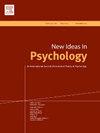自我评价的三方视角:自我关注的三种形式及其社会基础
IF 2.9
3区 心理学
Q2 PSYCHOLOGY, EXPERIMENTAL
引用次数: 0
摘要
当人们(和科学家)谈论自我关注或自尊时,他们的意思可能非常不同。目前还不清楚一个自称缺乏自尊的人究竟缺少什么。为了确定在考虑人类自我评价时应该区分的实质性维度,我们首先分析了心理学和哲学的理论,以确定社会基础,即社会交换中传递的社会信息的相关维度。在三个趋同的中心维度(即被他人喜欢的信息、被积极评价的信息和被视为平等的信息)的基础上,我们提出了三种相应的自尊形式,即自爱、自我评价和基于平等的自尊。虽然自爱和自我评价(以能力和性格为基础的概念)已经被研究过,但自尊(被定义为一个人拥有与他人相同权利的信念)在心理学研究中一直被忽视。我们概述了这三个维度的不同前因和后果,并讨论了与单一和二维方法相比,三方方法的优势,其跨文化适用性,以及未来研究和干预的潜力。本文章由计算机程序翻译,如有差异,请以英文原文为准。
A tripartite perspective on self-evaluation: Three forms of self-regard and their social basis
What people (and scientists) mean when they talk about self-regard or self-esteem can be very different. It is not clear exactly what a person lacks who reports a deficit in self-esteem. In order to identify the substantive dimensions that should be distinguished when considering human self-evaluation, we first analyze theories from psychology and philosophy in order to identify the social basis, i.e., the relevant dimensions of social information transmitted in social exchanges. On the basis of three converging central dimensions (i.e., information about being liked by others, being positively appraised, and being regarded as an equal), we then propose to distinguish three corresponding forms of self-regard, namely self-love, self-appraisal, and equality-based self-respect. While self-love and self-appraisal (both competence- and character-based conceptions) have already been researched, self-respect, defined as a person's belief in possessing the same rights as others, has been neglected in psychological research. We outline the differential antecedents and consequences of these three dimensions and discuss the (dis)advantages of a tripartite approach compared to uni- and two-dimensional approaches, its intercultural applicability, and potential for future research and interventions.
求助全文
通过发布文献求助,成功后即可免费获取论文全文。
去求助
来源期刊

New Ideas in Psychology
Multiple-
CiteScore
4.80
自引率
3.80%
发文量
37
期刊介绍:
New Ideas in Psychology is a journal for theoretical psychology in its broadest sense. We are looking for new and seminal ideas, from within Psychology and from other fields that have something to bring to Psychology. We welcome presentations and criticisms of theory, of background metaphysics, and of fundamental issues of method, both empirical and conceptual. We put special emphasis on the need for informed discussion of psychological theories to be interdisciplinary. Empirical papers are accepted at New Ideas in Psychology, but only as long as they focus on conceptual issues and are theoretically creative. We are also open to comments or debate, interviews, and book reviews.
 求助内容:
求助内容: 应助结果提醒方式:
应助结果提醒方式:


